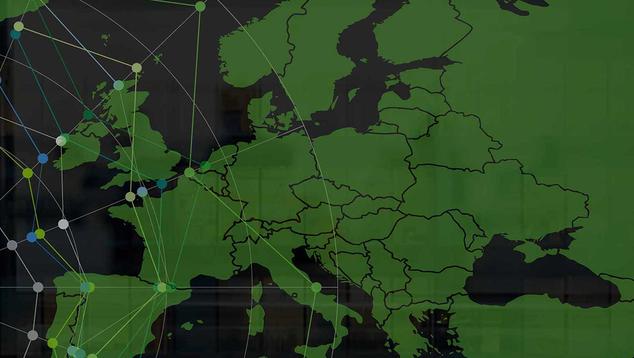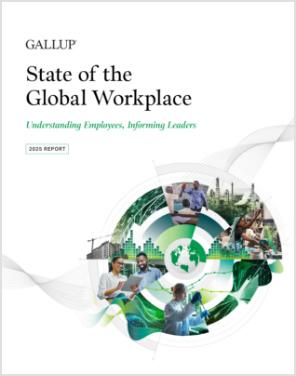Story Highlights
- European countries handled the pandemic well, compared with global trends
- Engagement needs a central spot in the European employee experience
- Workers in Europe are creating momentum for ESG reporting
European countries showed their resilience to health and economic shocks in 2020. Worker-friendly labour laws, flexible labour market instruments, strong welfare states and swift government responses to the pandemic likely played a factor in the relative success story of Europe last year.
According to Gallup's State of the Global Workplace: 2021 Report, Europeans were less likely to say their lives were affected "a lot" by the pandemic -- 36% in Western Europe and 37% in Eastern Europe, compared with the global average of 45%.
When asked about specific effects stemming from the pandemic, Europeans who were employed at the time of the pandemic were also less likely than workers globally to say they lost pay, temporarily stopped working, or lost their job or business due to the COVID-19 situation. Employed Europeans were also slightly less likely to report feeling worried or stressed. In fact, in Western Europe, reports of daily stress and anger decreased between 2019 and 2020.
But what about the employee experience of work during 2020? What is the state of work in Europe?
Europe's Employee Engagement Stagnation
Although the report shows a wide range in employee engagement figures across Europe, individual countries generally show little or no change in engagement levels between 2019 and 2020.
This European stagnation in 2020 follows an even longer decadal trend. Gallup's analysis finds that engagement in Europe has barely budged in the past 10 years. Across most Eastern and Western European countries, fewer than two in 10 employees are engaged by their day-to-day workplace experiences.
Even in Germany, widely considered the economic powerhouse of Europe, engagement has been stubbornly flat since 2001, according to Gallup's annual tracking.
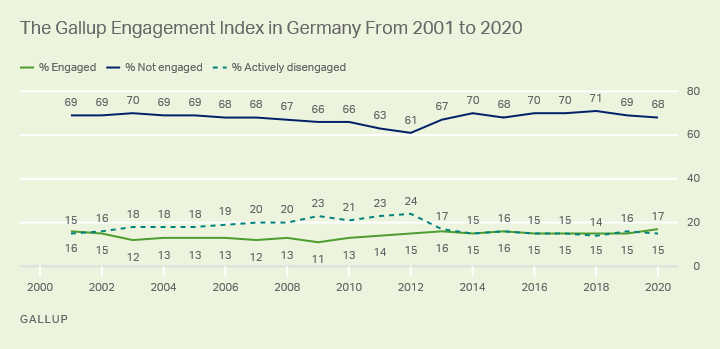
Line chart. In Germany in 2020, 68% of employees were not engaged and 15% were actively disengaged. Just 17% of German employees were engaged at work.
In contrast, employee engagement has been slowly but steadily rising in the U.S. and worldwide. In the U.S., engagement climbed from 26% in 2000 to 36% in 2020. Globally, it increased from 12% in 2009 to 20% in 2020. Although these may seem like minor improvements, they represent better experiences for millions of workers whose workplaces meet their needs and allow them to perform and develop.
Why Employee Engagement Matters
Gallup's understanding of employee engagement is about more than workers' happiness or satisfaction. Our approach to measuring engagement focuses on 12 workplace elements with proven links to performance outcomes, such as knowing what's expected of oneself at work, experiencing encouragement and development, and knowing how one's daily work contributes to the purpose of the organisation.
Our most recent meta-analysis has shown that improving employee engagement increases a host of positive organisational outcomes, including retention, safety, sales, productivity and profitability. This relationship is even more pronounced in difficult times. Gallup's studies of companies during difficult economic times have shown that engagement is an even stronger predictor of performance when times are tough.
Our German research has repeatedly demonstrated that engaged employees are more likely than their less engaged counterparts to say their workplace helps them be productive. This explains why engagement levels are increasingly a priority for business leaders across Europe.
| Strongly agree | |||||||||||||||||||||||||||||||||||||||||||||||||||||||||||||||||||||||||||||||||||||||||||||||||||
|---|---|---|---|---|---|---|---|---|---|---|---|---|---|---|---|---|---|---|---|---|---|---|---|---|---|---|---|---|---|---|---|---|---|---|---|---|---|---|---|---|---|---|---|---|---|---|---|---|---|---|---|---|---|---|---|---|---|---|---|---|---|---|---|---|---|---|---|---|---|---|---|---|---|---|---|---|---|---|---|---|---|---|---|---|---|---|---|---|---|---|---|---|---|---|---|---|---|---|---|
| % | |||||||||||||||||||||||||||||||||||||||||||||||||||||||||||||||||||||||||||||||||||||||||||||||||||
| Engaged | 71 | ||||||||||||||||||||||||||||||||||||||||||||||||||||||||||||||||||||||||||||||||||||||||||||||||||
| Not engaged | 23 | ||||||||||||||||||||||||||||||||||||||||||||||||||||||||||||||||||||||||||||||||||||||||||||||||||
| Actively disengaged | 4 | ||||||||||||||||||||||||||||||||||||||||||||||||||||||||||||||||||||||||||||||||||||||||||||||||||
| Gallup, 2016 | |||||||||||||||||||||||||||||||||||||||||||||||||||||||||||||||||||||||||||||||||||||||||||||||||||
In addition to productivity and performance, Gallup has also found that employee engagement is related to workers' wellbeing. Unsurprisingly, when people feel supported at work and get to do what they do best every day, they feel better about their lives overall. They're more likely to be considered thriving in their wellbeing and are less likely to report feeling stressed or worried. For example, 51% of actively disengaged European employees say they felt stressed the previous day, compared with 31% of engaged workers -- a finding that has serious implications for their physical and mental health.
| Thriving | Experienced stress yesterday | Experienced worry yesterday | |||||||||||||||||||||||||||||||||||||||||||||||||||||||||||||||||||||||||||||||||||||||||||||||||
|---|---|---|---|---|---|---|---|---|---|---|---|---|---|---|---|---|---|---|---|---|---|---|---|---|---|---|---|---|---|---|---|---|---|---|---|---|---|---|---|---|---|---|---|---|---|---|---|---|---|---|---|---|---|---|---|---|---|---|---|---|---|---|---|---|---|---|---|---|---|---|---|---|---|---|---|---|---|---|---|---|---|---|---|---|---|---|---|---|---|---|---|---|---|---|---|---|---|---|---|
| % | % | % | |||||||||||||||||||||||||||||||||||||||||||||||||||||||||||||||||||||||||||||||||||||||||||||||||
| Engaged | 66 | 31 | 29 | ||||||||||||||||||||||||||||||||||||||||||||||||||||||||||||||||||||||||||||||||||||||||||||||||
| Not engaged | 54 | 42 | 33 | ||||||||||||||||||||||||||||||||||||||||||||||||||||||||||||||||||||||||||||||||||||||||||||||||
| Actively disengaged | 30 | 51 | 50 | ||||||||||||||||||||||||||||||||||||||||||||||||||||||||||||||||||||||||||||||||||||||||||||||||
| Gallup, 2018-2020 | |||||||||||||||||||||||||||||||||||||||||||||||||||||||||||||||||||||||||||||||||||||||||||||||||||
Low Employee Engagement Is Not Inevitable
So, what accounts for this long-term stagnation in engagement levels across Europe, while other parts of the world have seen sizable increases?
Some may argue that Europeans are less engaged because, as a culture, they value life outside of work more than they value working. But in Germany, at least, that seems unlikely to be the whole story. When Gallup asked German employees what they would do if they inherited so much money that they'd never have to work again, about seven in 10 (74%) said they would continue working, a finding that has been consistent since 2001. These responses are a testament to the German work ethic and would suggest that a lack of engagement with work is not cultural.
Regardless of the reason, Europeans' low level of employee engagement is clearly a barrier to the innovation and productivity gains that Europe needs to stay relevant in an increasingly competitive global market for talent, products and services.
Across most Eastern and Western European countries, fewer than two in 10 employees are engaged by their day-to-day workplace experiences.
Despite a decade of stagnation, it would be wrong to think that low engagement is inevitable. Across cultures, we find that all human beings have the same emotional needs at work, and the research shows that when those needs are met, people respond with greater motivation, innovation, creativity and passion.
These are not impossible things for organisations to fulfil. Gallup's work with clients across Europe has shown that employee engagement can be improved -- when leaders choose to make work meaningful and make engagement a priority. These companies are able to engage 44% of their workforce, compared with only 16% across Europe. Their experience shows that it is possible to foster an engaging workplace culture in Europe.
Although low engagement is not inevitable, the consequences of maintaining the status quo will be ultimately disastrous for Europe. Global companies that offer more than a paycheck -- that offer meaning, purpose and development -- will eventually attract Europe's top talent. Legacy alone will not be enough to sustain future prosperity.
New Employee Priorities in Europe: Tackling ESG Standards
In Gallup's 2021 State of the Global Workplace report, we also examine employees' views on environmental, social and governance (ESG) criteria, which are generating a historic shift in the way business success is defined. Led by organisations such as the World Economic Forum, this trend includes business investors and government regulators who are looking for businesses to report on their positive impact on people and the planet. In Europe, perhaps more than any other region, the ESG revolution is being driven by employee sentiments and preferences.
-
European employees are not satisfied with efforts to preserve the environment. Workers across Europe are less satisfied than the rest of the world when it comes to environmental protections within their own country (at 46% satisfaction, compared with a global average of 62%). And this dissatisfaction is growing. This may be due to greater maturity around this topic in Europe.
Popular figures like Greta Thunberg, events like Fridays For Future and the rising popularity of "green parties" across Europe all point to a rising awareness of the need for climate action. Surprisingly, our study did not find a generational divide on this issue. Those younger than 40 and those aged 40 and older are about equally dissatisfied. It's not a "young person" thing.
In Europe, perhaps more than any other region, the ESG revolution is being driven by employee sentiments and preferences.
-
Europeans feel more respected than employees in other regions. Disrespect in the workplace is toxic. Gallup has found that if an employee disagrees that they are respected at work, there is a 90% chance they have experienced discrimination or harassment on the job. Respect is the foundation of any meaningful teamwork, and therefore critical to high performance of any kind. It is also the bedrock of an inclusive workplace.
Mutual respect keeps employees safe and protects individuals so they can uniquely be themselves. The good news is that only 6% of employees in Western Europe and only 10% of employees in Eastern Europe say they were not treated with respect all day on the previous day (in or out of work), compared with 14% globally. Interestingly, we found no significant difference between male and female respondents or between younger and older respondents. We did, however, find a link in 2019 between engagement levels and feeling respected. Engaged employees were more likely than actively disengaged workers to report feeling respected at work.
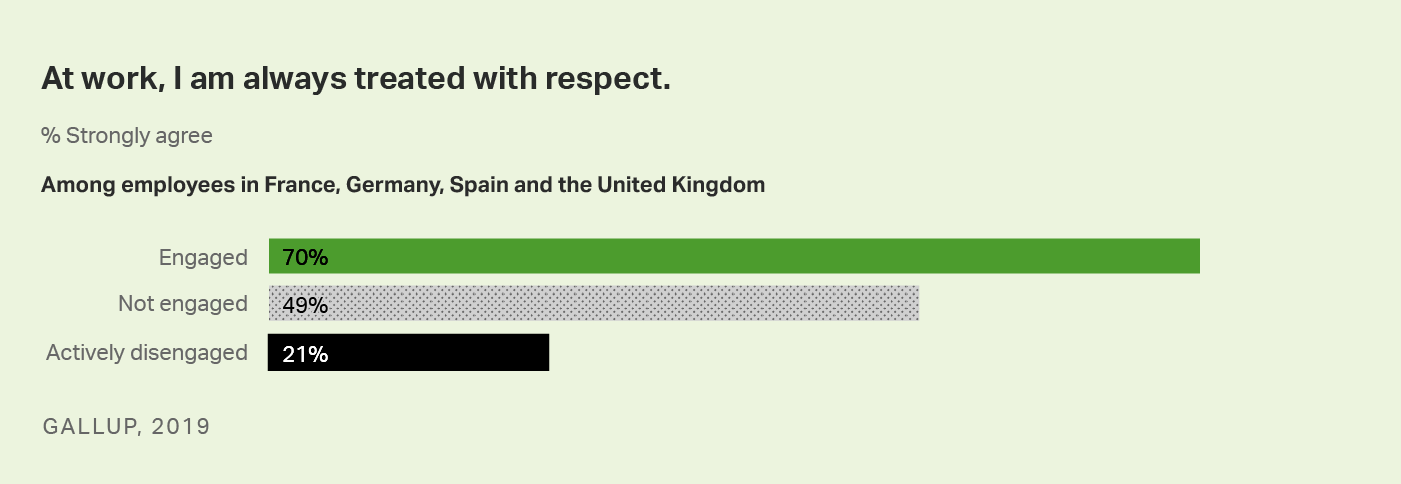
Custom graphic. Among employees in France, Germany, Spain and the UK, those who are engaged are more likely to strongly agree that their employer treats them with respect. 70% of engaged employees strongly agree, compared with 49% of not engaged and 21% of actively disengaged employees.
-
Eastern Europeans indicate a strong perception of business corruption. Although there are pervasive concerns across Europe about corruption in business, Gallup finds that fewer Western Europeans report widespread business corruption (51%) than the global average (69%), with Eastern Europeans (75%) surpassing the global average. This perception of corruption ultimately erodes the trust employees have with their employers, making any leadership initiatives -- including engagement and ESG-related programs -- much more challenging.
European employers will need to go the extra mile to prove to their own people that they are transparent, honest and fair. Four in 10 employees strongly agree that their employer would do the right thing if they raised a concern about ethics and integrity. However, doing the right thing is increasingly a business necessity. Ethics and compliance issues quickly become safety, productivity, legal, cultural and brand issues. One lever that employers have at their disposal is the engagement of their employees. Gallup's European research has shown that engaged employees have more confidence in the moral integrity of their business leaders.
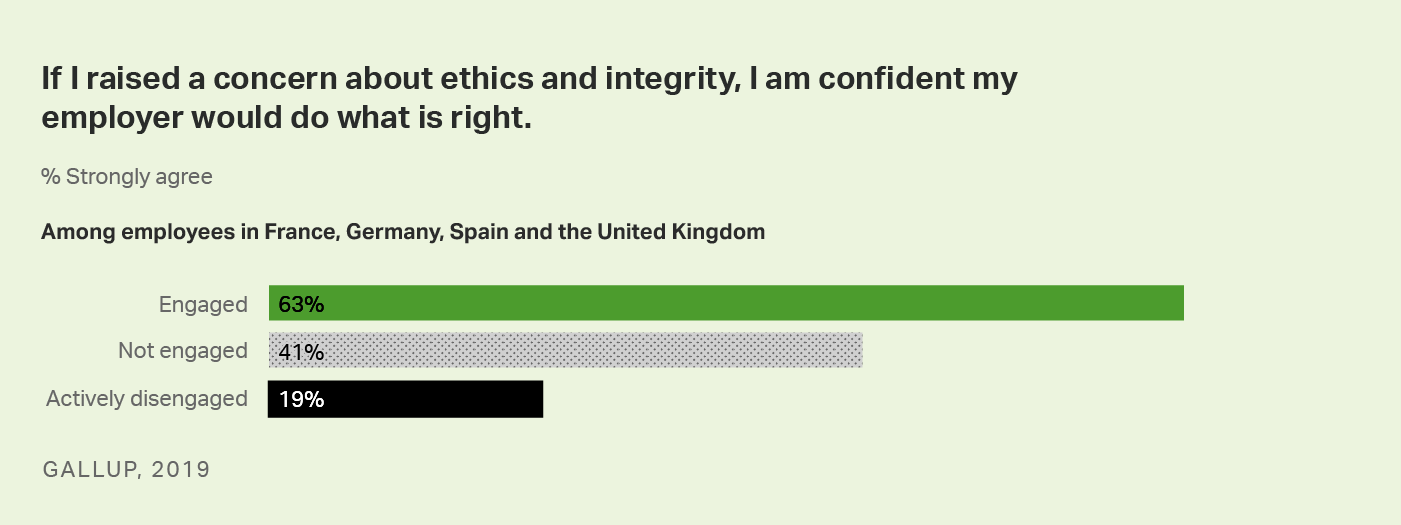
Custom graphic. Among employees in France, Germany, Spain and the UK, those who are engaged are more likely to strongly agree that their employer would do what is right if they raised concerns about ethics and integrity. 63% of engaged employees strongly agree, compared with 41% of not engaged and 19% of actively disengaged employees.
How European Companies Can Fix Their Workplaces
If there was ever a time to rethink the workplace, it is now. European workplace cultures are not working for most employees -- and have not been for some time. Stagnant, low engagement levels across Europe show that leaders are leaving productivity, profits and, perhaps most importantly, purpose on the table. In addition, ESG-related demands show that employees expect more from their employers. European companies thus need to make work more rewarding and more meaningful for their people. Here's how to get started:
-
Organisational change begins at the top. Gallup has partnered with organisations that have driven engagement from below-average engagement levels to exceptionally high levels of 70% or more engaged. This has radically transformed their organisational performance. The key factor, however, was the commitment of leadership to long-term change.
-
Leaders need to survey their employees on employee engagement, wellbeing and ESG-related issues. 2020 made it clear that healthy businesses require engaged, healthy and optimistic people. Engaging managers are drivers of such sentiment, yet most lack an understanding of how well they engage their people and how they feel about work. While 97% of managers feel they are doing a good job of managing their people, 69% of employees report experiencing bad managers, according to Gallup's research in Germany. Companies need to provide managers with data so they know where they stand and can take action. A survey itself will not fix these issues, but it can provide the basis for important conversations and data-driven decision-making, rather than conjecture and guesswork.
-
The single greatest influence on employee engagement is the manager. Managers account for 70% of the variance in team engagement. For this reason, organisations need to focus on training their managers to better engage and develop their people. When a manager encourages employee development, workplace productivity and wellbeing increase. The reality, however, is that most managers do not receive training to help them improve their people management skills. In Germany, 60% of managers report receiving no such training. This is concerning, given that most managers do not have natural management talent. They must be educated and trained to be more effective at having quality conversations with employees. In short, they need to be taught how to be coaches.
European companies that focus on these three areas have seen their employee engagement soar while also having a positive effect on employee wellbeing and company performance. It is time for other European companies to follow suit. European employees deserve it!
Create a low-burnout, high-performance culture of engagement and wellbeing:
- Sign up for a webinar to learn more about European workplace trends. Or explore our webinars that dive into data from workplaces all over the world.
- Learn how we help organisations everywhere improve employee engagement.
- Create resilient teams and organisations by enhancing employee wellbeing.
